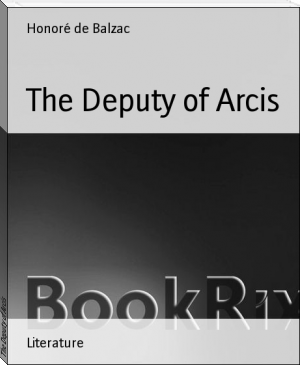The Deputy of Arcis - Honoré de Balzac (little red riding hood read aloud TXT) 📗

- Author: Honoré de Balzac
Book online «The Deputy of Arcis - Honoré de Balzac (little red riding hood read aloud TXT) 📗». Author Honoré de Balzac
"Ah! my dear, I entreat you, don't make fun of my poor husband."
"I am not talking of your husband, I am talking of you. Last night you so surprised me that I have come here to take back my words. I like people to follow my advice, but I don't like them to go beyond it."
"At any other time I should make you explain what horrible impropriety I have committed under your counsel; but fate has interposed and settled everything. Monsieur de Sallenauve will, at any cost, disappear from our path, and therefore why discuss the degree of kindness one might have shown him?"
"But," said Madame de Camps, "since I must tell you all, I have come to think him a dangerous acquaintance,--less for you than for some one else."
"Who?" asked Madame de l'Estorade.
"Nais. That child, with her passion for her 'preserver,' makes me really uneasy."
"Oh!" said the countess, smiling rather sadly, "are you not giving too much importance to childish nonsense?"
"Nais is, of course, a child, but a child who will ripen quickly into a woman. Did you not tell me yourself that you were sometimes frightened at the intuition she showed in matters beyond her years?"
"That is true. But what you call her passion for Monsieur de Sallenauve, besides being perfectly natural, is expressed by the dear little thing with such freedom and publicity that the sentiment is, it seems to me, obviously childlike."
"Well, don't trust to that; especially not after this troublesome being ceases to come to your house. Suppose that when the time comes to marry your daughter, this fancy should have smouldered in her heart and increased; imagine your difficulty!"
"Oh! between now and then, thank Heaven! there's time enough," replied Madame de l'Estorade, in a tone of incredulity.
"Between now and then," said Madame de Camps, "Monsieur de Sallenauve may have reached a distinction which will put his name on every lip; and Nais, with her lively imagination, is more likely than other girls to be dazzled by it."
"But, my dear love, look at the disproportion in their ages."
"Monsieur de Sallenauve is thirty, and Nais will soon be fourteen; that is precisely the difference between you and Monsieur de l'Estorade."
"Well, you may be right," said Madame de l'Estorade, "and the sort of marriage I made from reason Nais may want to make from folly. But you needn't be afraid; I will ruin that idol in her estimation."
"But there again, as in the comedy of hatred you mean to play for Monsieur de l'Estorade's benefit, you need moderation. If you do not manage it by careful transitions, you may miss your end. Never allow the influence of circumstances to appear when it is desirable than an impulse or an action should seem spontaneous."
"But," said Madame de l'Estorade, excitedly, "do you think that my hatred, as you call it, will be acted? I do hate him, that man; he is our evil genius!"
"Come, come, my dear, be calm! I don't know you--you, you have always been Reason incarnate."
At this moment Lucas entered the room and asked his mistress if she would receive _a_ Monsieur Jacques Bricheteau. Madame de l'Estorade looked at her friend, as if to consult her.
"He is that organist who was so useful to Monsieur de Sallenauve during the election. I don't know what he can want of me."
"Never mind," said Madame de Camps, "receive him. Before beginning hostilities it is always well to know what is going on in the enemy's camp."
"Show him in," said the countess.
Jacques Bricheteau entered. Expecting to be received in a friendly country, he had not taken any particular pains with his dress. An old maroon frock-coat to the cut of which it would have been difficult to assign a date, a plaid waistcoat buttoned to the throat, surmounted by a black cravat worn without a collar and twisted round the neck, yellowish trousers, gray stockings, and laced shoes,--such was the more than negligent costume in which the organist allowed himself to appear in a countess's salon.
Requested briefly to sit down, he said,--
"Madame, I hope I am not indiscreet in thus presenting myself without having the honor of being known to you, but Monsieur Marie-Gaston told me of your desire that I should give music-lessons to your daughter. At first I replied that it was impossible, for all my time was occupied; but the prefect of police has just afforded me some leisure by dismissing me from a place I filled in his department; therefore I am now happy to place myself at your disposal."
"Your dismissal, monsieur, was caused by your activity in Monsieur de Sallenauve's election, was it not?" asked Madame de Camps.
"As no reason was assigned for it, I think your conjecture is probably correct; especially as in twenty years I have had no trouble whatever with my chiefs."
"It can't be denied," said Madame de l'Estorade, sharply, "that you have opposed the views of the government by this proceeding."
"Consequently, madame, I have accepted this dismissal as an expected evil. What interest, after all, had I in retaining my paltry post, compared to that of Monsieur de Sallenauve's election?"
"I am very sorry," resumed Madame de l'Estorade, "to be unable to accept the offer you are good enough to make me. But I have not yet considered the question of a music-master for my daughter; and, in any case, I fear that, in view of your great and recognized talent, your instruction would be too advanced for a little girl of fourteen."
"Well," said Jacques Bricheteau, smiling, "no one has recognized my talent, madame. Monsieur de Sallenauve and Monsieur Marie-Gaston have only heard me once or twice. Apart from that I am the most obscure of professors, and perhaps the dullest. But setting aside the question of your daughter's master, I wish to speak of a far more important interest, which has, in fact, brought me here. I mean Monsieur de Sallenauve."
"Has Monsieur de Sallenauve," said Madame de l'Estorade, with marked coldness of manner, "sent you here with a message to my husband?"
"No, madame," replied Jacques Bricheteau, "he has unfortunately given me no message. I cannot find him. I went to Ville d'Avray this morning, and was told that he had started on a journey with Monsieur Marie-Gaston. The servant having told me that the object and direction of this journey were probably known to you--"
"Not in any way," interrupted Madame de l'Estorade.
Not as yet perceiving that his visit was unacceptable and that no explanation was desired, Jacques Bricheteau persisted in his statement:--
"This morning, I received a letter from the notary at Arcis-sur-Aube, who informs me that my aunt, Mother Marie-des-Anges, desires me to be told of a scandalous intrigue now being organized for the purpose of ousting Monsieur de Sallenauve from his post as deputy. The absence of our friend will seriously complicate the matter. We can take no steps without him; and I cannot understand why he should disappear without informing those who take the deepest interest in him."
"That he has not informed you is certainly singular," replied Madame de l'Estorade, in the same freezing tone; "but as for my husband or me, there is nothing to be surprised about."
The meaning of this discourteous answer was too plain for Jacques Bricheteau not to perceive it. He looked straight at the countess, who lowered her eyes; but the whole expression of her countenance, due north, confirmed the meaning he could no longer mistake in her words.
"Pardon me, madame," he said, rising. "I was not aware that the future and the reputation of Monsieur de Sallenauve had become indifferent to you. Only a moment ago, in your antechamber, when your servant hesitated to take in my name, Mademoiselle, your daughter, as soon as she heard I was the friend of Monsieur de Sallenauve, took my part warmly; and I had the stupidity to suppose that such friendliness was the tone of the family."
After this remark, which gave Madame de l'Estorade the full change for her coin, Jacques Bricheteau bowed ceremoniously and was about to leave the room, when a sudden contradiction of the countess's comedy of indifference appeared in the person of Nais, who rushed in exclaiming triumphantly,--
"Mamma, a letter from Monsieur de Sallenauve!"
The countess turned crimson.
"What do you mean by running in here like a crazy girl?" she said sternly; "and how do you know that this letter is from the person you mention?"
"Oh!" replied Nais, twisting the knife in the wound, "when he wrote you those letters from Arcis-sur-Aube, I saw his handwriting."
"You are a silly, inquisitive little girl," said her mother, driven by these aggravating circumstances quite outside of her usual habits of indulgence. "Go to your room." Then she added to Jacques Bricheteau, who lingered after the arrival of the letter,--
"Permit me, monsieur."
"It is for me, madame, to ask permission to remain until you have read that letter. If _by chance_ Monsieur de Sallenauve gives you any particulars about his journey, you will, perhaps, allow me to profit by them."
"Monsieur de Sallenauve," said the countess, after reading the letter, "requests me to inform my husband that he has gone to Hanwell, county of Middlesex, England. You can address him there, monsieur, to the care of Doctor Ellis."
Jacques Bricheteau made a second ceremonious bow and left the room.
"Nais has just given you a taste of her quality," said Madame de Camps; "but you deserved it,--you really treated that poor man too harshly."
"I could not help it," replied Madame de l'Estorade; "the day began wrong, and all the rest follows suit."
"Well, about the letter?"
"It is dreadful; read it yourself."
Madame,--I was able to overtake Lord Lewin, the Englishman of whom
I spoke to you, a few miles out of Paris. Providence sent him to
Ville d'Avray to save us from an awful misfortune. Possessing an
immense fortune, he is, like so many of his countrymen, a victim
to _spleen_, and it is only his natural force of character which
has saved him from the worst results of that malady. His
indifference to life and the perfect coolness with which he spoke
of suicide won him Marie-Gaston's friendship in Florence. Lord
Lewin, having studied the subject of violent emotions, is very
intimate with Doctor Ellis, a noted alienist, and it not
infrequently happens that he spends two or three weeks with him at
Hanwell, Middlesex Co., one of the best-managed lunatic asylums in
England,--Doctor Ellis being in charge of it.
When he arrived at Ville d'Avray, Lord Lewin saw at once that
Marie-Gaston had all the symptoms of incipient mania. Invisible to
other eyes, they were apparent to those of Lord Lewin. In speaking
to me of our poor friend, he used the word _chiffonait_,--meaning
that he picked up rubbish as he walked, bits of straw,





Comments (0)